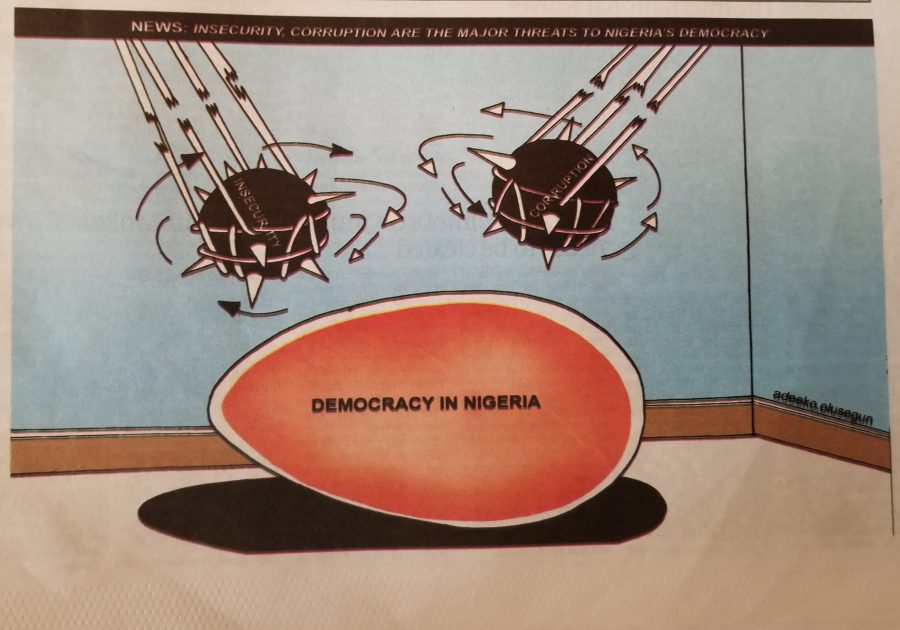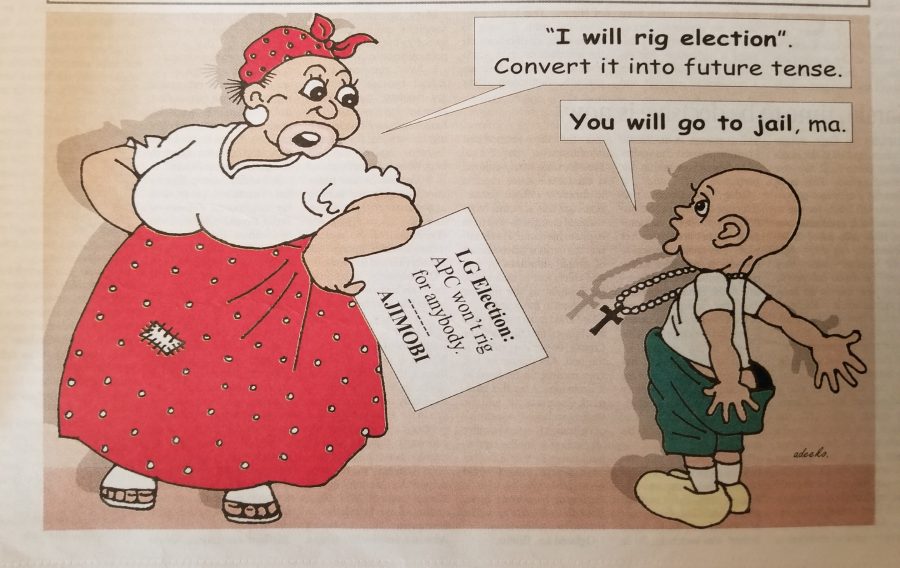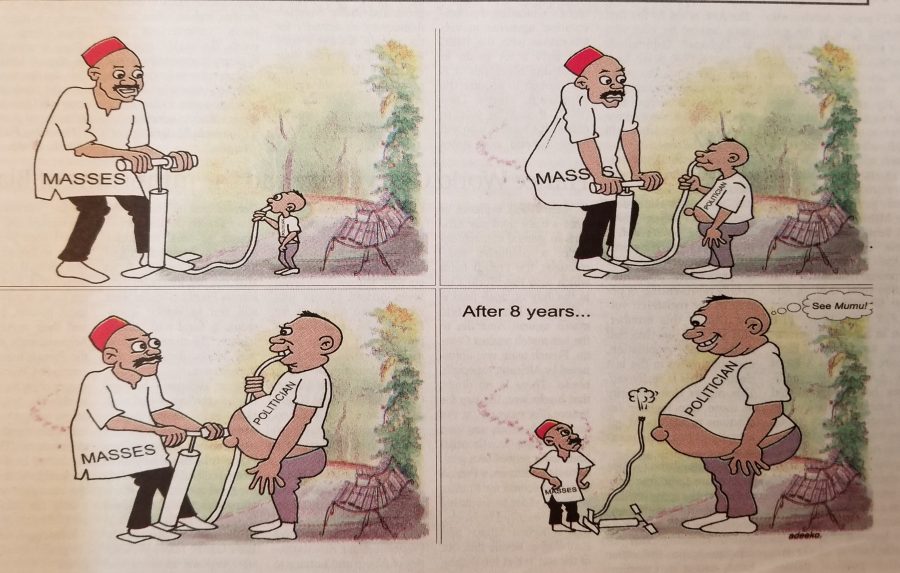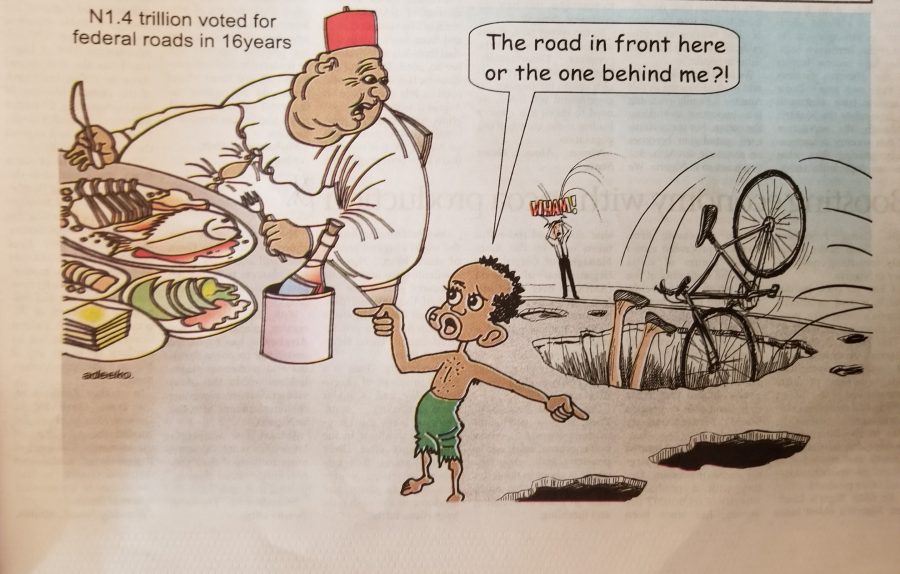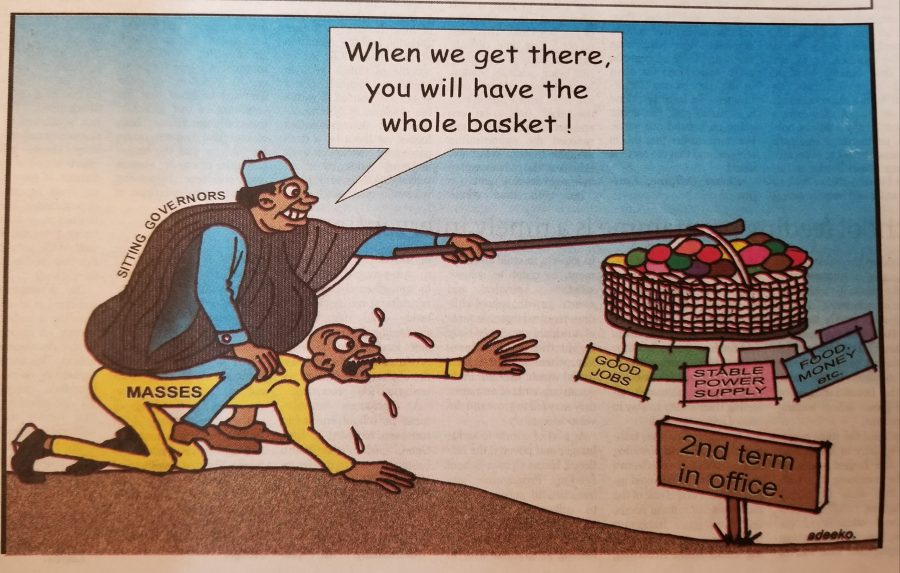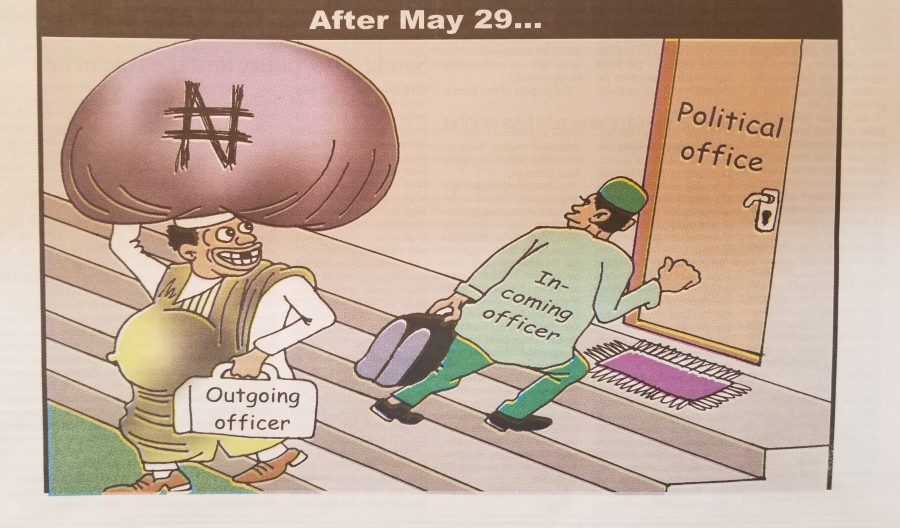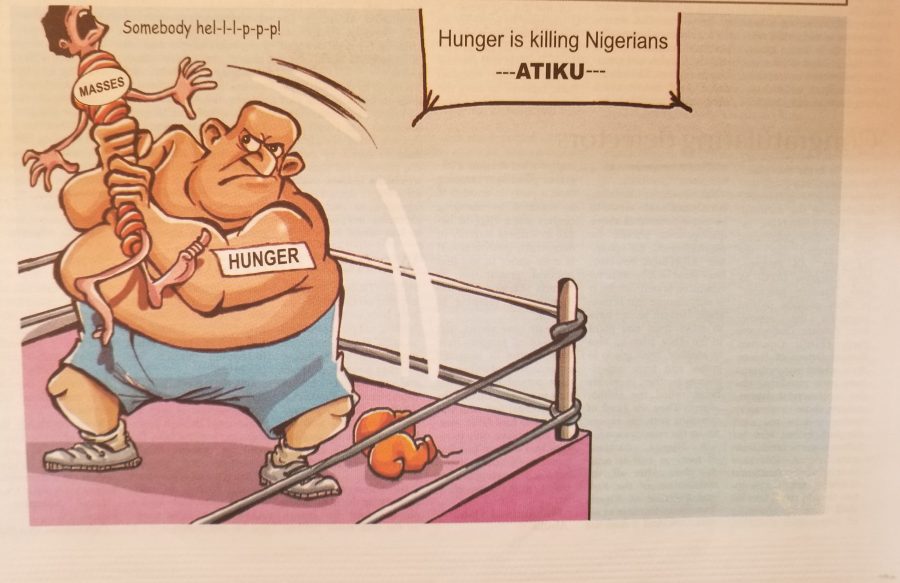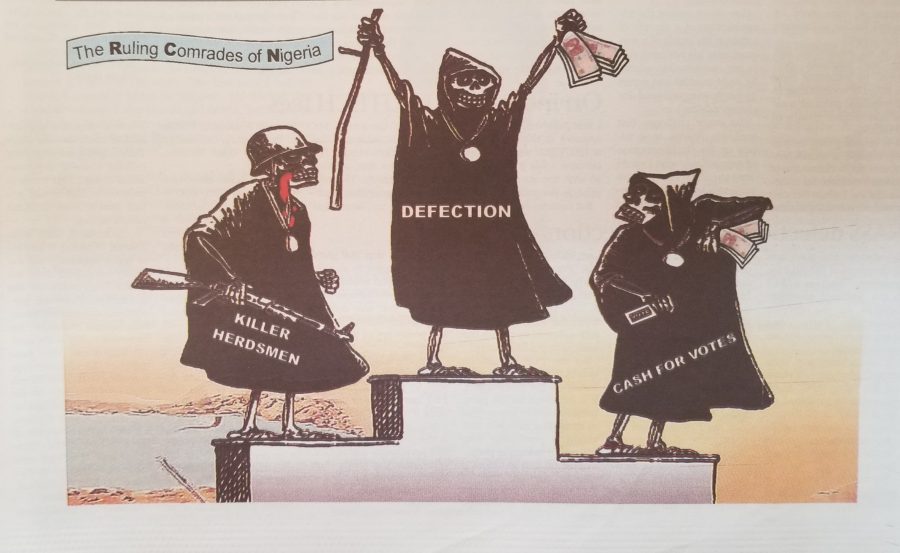Tag Archives: Nigerian Elections 2019
Adeeko Olusegun – Democracy in Nigeria
This cartoon by Adéẹk̀ọ́ Olùṣẹǵun of the Nigerian Tribune identifies some of the threats to democracy in Nigeria. Here, there are two thorny, guarded, and guided missiles targeted at an egg in a confined space. The egg represents of democracy in Nigeria.
Everything about Adéẹk̀ọ́’s depictions are symbolic. The choice of an egg signifies the fragility of Nigeria’s democracy. Its reddish color seems to suggest that democracy in the country has reached a boiling point, no thanks to the increased stories of corruption and insecurities that headline national news as the 2019 elections approach.
Adeeko Olusegun – I Will Rig Election…
In this cartoon, there is a woman and a boy talking. The woman finds a teachable moment in a statement made by Governor Abiola Ajimobi of Ọ̀yọ́ state. According to the governor, his political party, the All Progressives Congress (APC) “won’t rig [election] for anybody”.
The woman wants the child to practice his English language skills by asking him to convert “I will rig election” into future tense. The poor boy instead thinks the woman implies that she would rig election and he replies that she would go to jail.
In a way, this is a didactic cartoon. It seems to be teaching adults and young children about what should happen if someone takes part in fraudulent electoral activities.
Adeeko Olusegun – Masses after 8 Years
This cartoon, as one would expect, is funny. It is also tragic. Funny because it reveals how gullible Nigerian masses are. Tragic because it highlights the parasitic relationship between the masses and politicians in the country. Overall, the cartoon narrates an 8-year long story (“8 years” implies two terms in office.).
First, there is a red-capped man holding a bike pump that is inserted in the mouth of a tiny politician. This is the first encounter between both parties (the masses and politicians) and it reveals the dynamics of power relation between them. At the initial encounter, the masses seem to wield more power. This is probably the time when politicians canvass for votes. The choice of having a the man signifying the masses put on a red cap is also loaded with meanings. For one, it signifies respect. In some parts of Nigeria, only respected and highly important persons are traditionally permitted to use a red cap.
One can also see the progression of the politician from a tiny man to a big man.
The last picture in the cartoon is a reversal of the first. After 8 years, the politician has become huge – with a protruding belly (probably as a result of embezzling public wealth). The once respected man has also become a laughing stock, a mumu (Nigerian pidgin English word which means a dunce). Essentially, this cartoon reveals how deceptive Nigerian politicians are and how far they are willing to go to get what they want. Even the most respected individuals in the society become preys to their deceptions.
Adeeko Olusegun – N1.4 Trillion Voted for Federal Roads in 16 Years
Nigeria returned to democratic rule in 1999. Since 2002, an estimated 1.4 trillion Naira have been budgeted for construction, repair, and maintenance of federal roads. Ironically, Nigerian roads are not safe. This piece is a commentary on the reality of unsafe, horrible roads and the apathy of Nigerian leaders (towards the horrible state of roads in the country).
In the cartoon, there is a feasting pot-bellied, obese, apathetic, red-capped man who seems to represents Nigerian leaders. There is also a shirtless barefooted man looking towards and questioning the seated leader while also pointing to two dark (signifying depth) potholes. Unfortunately, the shirtless man is not getting any attention.
In addition, there is a large deep hole that a biker already crashed into. Perhaps, this is used to show that Nigerian roads are not safe for bikers and motorists alike. There is also an image of a helpless bystander lamenting and shocked by the accidents on the roads.
The irony behind this cartoon is that as the 2019 elections draw nearer, many politicians have, again, started making promises that they would provide “good and motorable” roads for Nigerians.
Adeeko Olusegun – The Ruling Comrades of Nigeria
An average Nigerian would probably tell you that the killer herdsmen are the toughest menace they know that is threatening the country’s democracy. In 2018 alone, there has been more stories of herdsmen wrecking havoc in wanton fashion accross the country.
Here, however, Adéẹk̀ọ́ Olùṣẹǵun thinks otherwise. He highlights the most pressing challenges in Nigeria. He calls them the Ruling Comrades of Nigeria. They are KILLER HERDSMEN, DEFECTION, CASH FOR VOTES. For one, his choice of the word “comrade” is quite significant for meaning. It shows that these challenges work hand in hand.
Perhaps the most symbolic feature of this piece lies in Adéẹk̀ọ́’s hierarchical arrangement of the comrades. He places them on a medal podium. Killer Herdsmen to the left, Defection at the center, and Cash for Votes to the right. Of the three, DEFECTION is the winner, followed by Killer Herdsmen with a raised platform and Cash for Votes as the last. Adéẹk̀ọ́ seems to be suggesting that the challenges of killer herdsmen and cash for votes are not as brutal and threatening as political defections.
It’s also instructive to point out the fact that only both election- or politics-related Defection and Cash for Votes involve money. This is not strange, money is a huge factor in Nigerian politics. Many politicians run for office because of the juicy remunerations that come with being a public office-holder. And people come out to cast their vote because of the hope of being paid by politicians.
It is also important to point out that both Killer Herdsmen and Cash for Votes look up to Defection. Overall, while these comrades are related, Adéẹk̀ọ́ believes defections among politicians is threatening the democracy of the country. It is in a class of its own.
Awosiyan Segun – Whose Fault, Who Cares?
Late Chief MKO Abiola was “the acclaimed winner of the June 12, 1993, presidential election.” The election was annulled by the then military ruler of Nigeria, President Badamosi Babangida. Nonetheless, to many, the election is still considered to be the most free and fairest election in contemporary Nigerian history. In fact, since the annulment, various pro-democracy groups and Nigerians have been clamoring for government’s recognition of Chief Abiola’s mandate.
On June 6, 2018, President Muhammadu Buhari declared that May 29, 2018, would be the last Democracy Day to be celebrated that day. Instead, he noted that starting from 2019, June 12 will become Democracy Day.
Seeing that this decision was made few months away from the 2019 elections, many Nigerians believe Mr. Buhari’s decision was made based on political permutations. One of the arguments made by skeptics is that he hopes to use his declaration to bait the support of voters in the South Western states of Nigeria. The late Chief Abiola was from one of those states, Ogun.
In this cartoon, Awosiyan Segun reflects on the possible rationale behind Mr. Buhari’s decision and the biased thinking of the skeptics. According to Awosiyan, not honoring the late Chief “for 16 years was never seen as POLITICS! It is now POLITICS!” (Emphasis is included by the cartoonist.)
D.D. Onu – Jaw Jaw
This is yet another dialogue between two individuals. One of them is a member of the All Progressives Congress (APC). And he is preparing for an election by buying and hoarding brooms – the logo of the APC. The other individual seems not interested in his friend’s party activities. Instead, he pleads with his friend not to dispose those brooms after the election as he would like to reuse them to clear dirts and refuse in his state.

